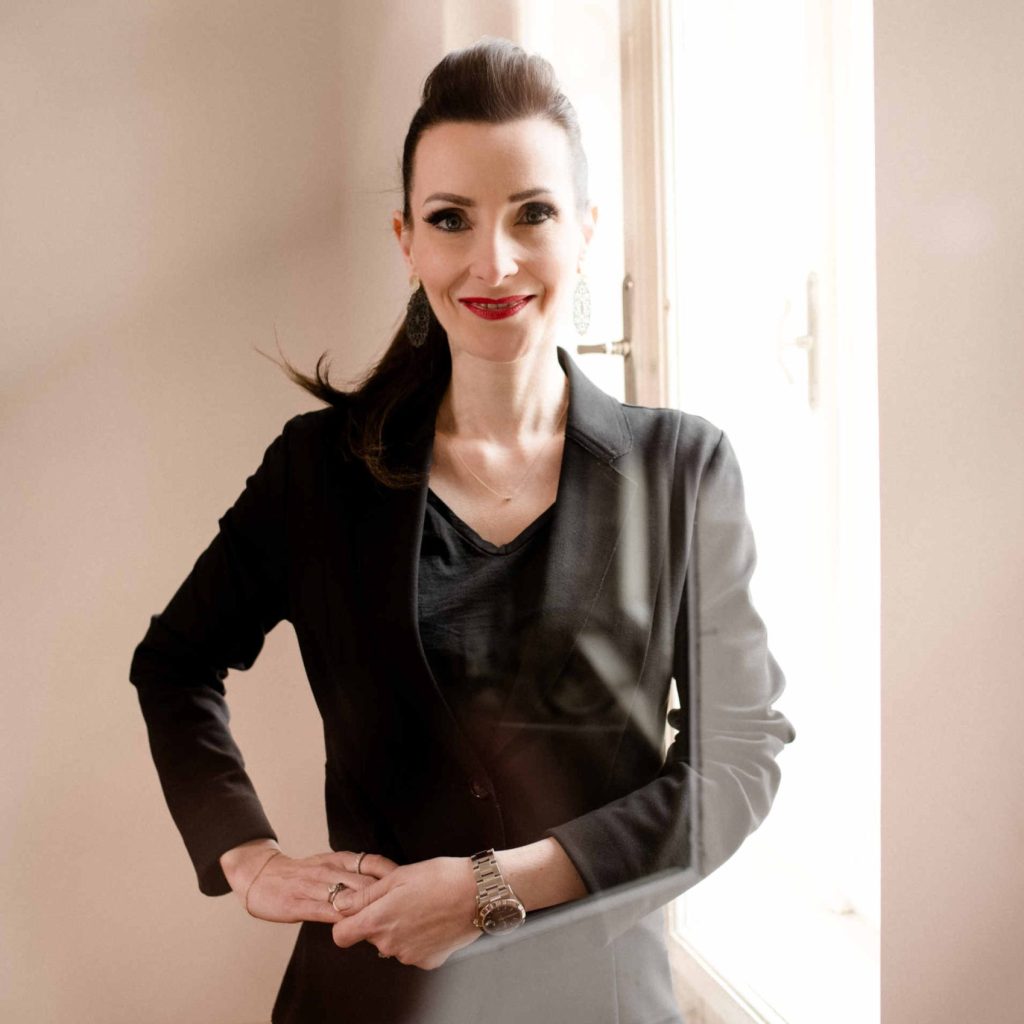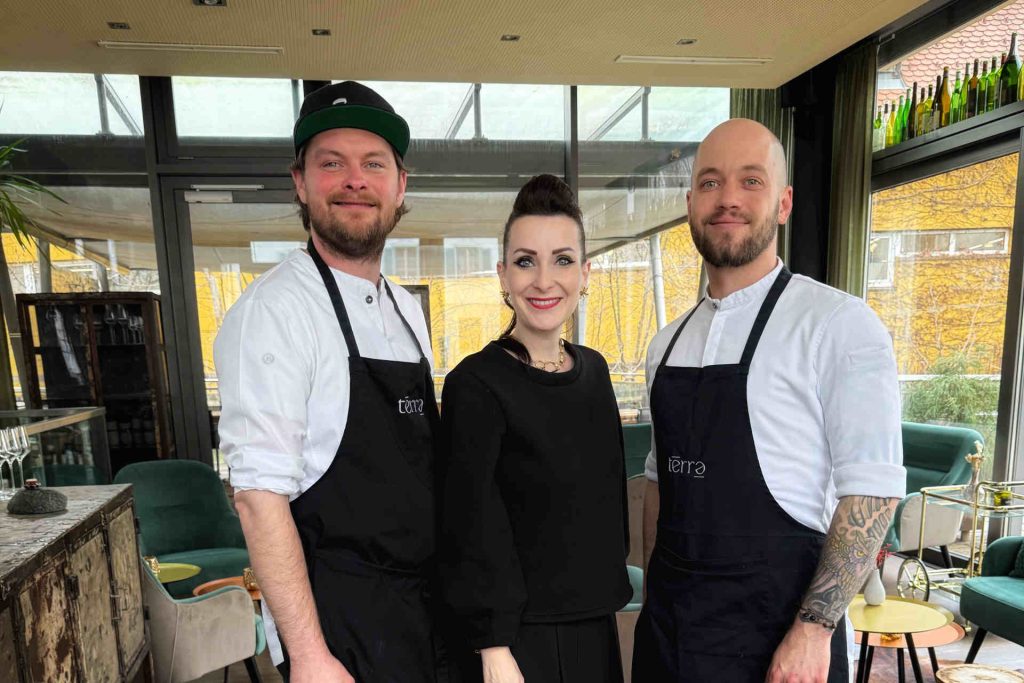

“This combination of nature and this cosmopolitan cuisine is what makes Terra special for me.”
Maximilian Grandtner, head chef at Terra in the Stainz mill
What happens when vegetable roots, sea fish and fermented pears meet herbal art and kombucha? In this interview, Johann Schmuck and Maximilian Grandtner talk about the philosophy behind Terra, signature dishes with char and celery root, creative no-alk pairings – and why real enjoyment can sometimes just be a schnitzel. A journey beneath the surface – in the truest sense of the word.
ALEXANDRA GORSCHE: Terra means earth. How did this restaurant name come about?
JOHANN SCHMUCK: That's right - in principle, many good products such as vegetables come directly from the earth. But for us, Terra is even more than that, it's also the world and that's why we serve cosmopolitan cuisine, including seafood.
Just to unravel the story a little: How long have you been in Stainz?
JOHANN SCHMUCK: Basically since 2015. The idea of the Terra restaurant, which is practically underground, was born in 2022.
Every chef has their own signature dish. Tell us a little more about it.
JOHANN SCHMUCK: My signature dish is char. We marinate it briefly in raspberry vinegar. In winter, we combine it with beetroot and in summer, when we get raspberries, we make it with raspberries. So char with raspberry and mustard or with beetroot in winter.
What does real enjoyment mean to you?
JOHANN SCHMUCK: Sitting at the table with the right people, a cool bottle of wine, cool food and that can be very simple, but it can also be a high-end menu. It's always important to me who I'm sitting at the table with and that's also a pleasure for me.
Maximilian – you are responsible for some of the drinks.
MAXIMILIAN GRANDTNER: I make the non-alcoholic accompaniments, the kombucha, the ginger beers, kefir.
How do you perceive the demand: is no and low alcohol becoming more and more popular?
MAXIMILIAN GRANDTNER: You notice time and again that certain people at the table prefer to go in the non-alcoholic direction, partly because of driving. It's a very, very complex, big world.
Maybe you can tell us some great combinations.
MAXIMILIAN GRANDTNER: I always make sure that we integrate a component of the dish into the drink or even a spice. Last fall, we served pumpkin with star anise as kombucha. We've now had pear with vanilla in spring. I always try to incorporate the vegetables that we juice ourselves with certain spices or herbs that you wouldn't normally expect in your non-alcoholic drink or in a drink in general to intensify the flavor of our dish.
What does enjoyment mean to you?
MAXIMILIAN GRANDTNER: For me, it's comfort food. We often overthink a lot in the kitchen because that's also our job. That's why a simple dish like a minced pork loaf with mashed potatoes or a schnitzel is just great from time to time. Paired with friends at a table, on a Sunday with a bottle of wine, where you don't have to think much, just enjoy. That's enjoyment for me!
Is there a pairing that is also very challenging?
JOHANN SCHMUCK: What I find extremely cool is the pickled asparagus with nettle and Maiwipferl.
What is the perfect non-alcoholic accompaniment here?
MAXIMILIAN GRANDTNER: The asparagus brings a slight acidity through the pickling process, while the nettle adds a floral note. That's why we thought of ginger beer here, mixed with a little lemon balm.
What makes Terra special for you?
MAXIMILIAN GRANDTNER: The combination of herbs, spices, vegetables and roots. We have now used celery roots, for example. Very few people even know that you can use the root. They always just buy the tuber. We have an open-minded approach and love to combine products such as celery root with products such as turbot. We also love going in an Asian direction. This combination of nature and this cosmopolitan cuisine is what defines Terra for me.
We keep talking about creativity. How does the process of creating a dish work for you?
JOHANN SCHMUCK: Sometimes it happens extremely quickly. We always coordinate with each other. So we think: Okay, what time is it now? What do we get? Especially when it comes to vegetables, we always talk to Mrs. Wagner, who brings us the main vegetables. More heads also bring more ideas and that's how many new dishes are created.
What makes a good team for you?
JOHANN SCHMUCK: I have to say that everyone has been here for a long time. Like Max, who started in our kitchen as a dishwasher back in 2015 and then joined the mill as head chef in 2019. There is a basis of trust. And Max also knows the direction I want to take with the dishes. It's exciting when we simply try things out and see what dishes emerge when we try out new pairings.
Which part of your work do you enjoy the most?
MAXIMILIAN GRANDTNER: Producing, developing and seeing how certain things behave, even over a longer period of time. For example, we have now made our own miso with porcini mushrooms and walnuts. It's maturing now, I won't see it for the next year, but then I'm really looking forward to the result. We also have the mushrooms from Schönerhof in Marhof, which supplies us. And now we are in the process of freezing our own soy sauce from mushrooms. That is also fermenting. I won't see it for a year, but I'm really looking forward to tasting the result and being able to work with it.
How much information and knowledge do guests receive?
MAXIMILIAN GRANDTNER: It always depends on the guest or the table. Some people want to know more. Some people just want their first date, a good meal and peace and quiet. It's simply our job to read this over and over again.
I was allowed to take a look behind the scenes at your place today and there are lots and lots of great herbs. Some things are familiar, some are not. You work with exceptional producers here in the region.
JOHANN SCHMUCK: Yes, I've been working with Mrs. Wagner, who has our organic vegetables, since 2015. It's also quite funny because I went to school with her daughter and I didn't know that she had vegetables. And suddenly, as we opened the door, she suddenly said: “I have organic vegetables”, and she's been bringing us vegetables ever since. It's always a highlight for us when there's something new and we first have to ask what we actually have in the kitchen.
You have moss on the walls and a watermill outside the door. To what extent does nature influence your concept?
JOHANN SCHMUCK: I've always liked it. Nature, wood. We've always enjoyed cooking on moss. That is life. I love the smell. Just nature.



What happens when vegetable roots, sea fish and fermented pears meet herbal art and kombucha? In this interview, Johann Schmuck and Maximilian Grandtner talk about the philosophy behind Terra, signature dishes with char and celery root, creative no-alk pairings – and why real enjoyment can sometimes just be a schnitzel. A journey beneath the surface – in the truest sense of the word.